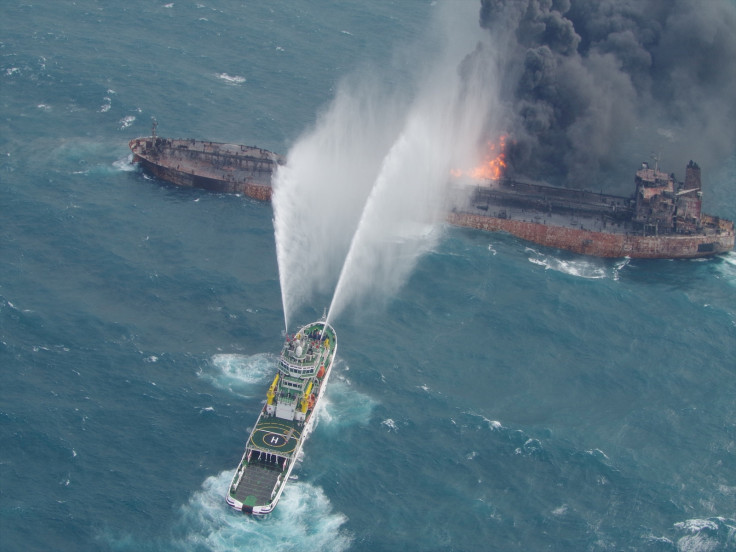Iranian oil tanker explodes and sinks off China, leaving 32 presumed dead
The stricken ship had been listing for over a week

A burning Iranian oil tanker exploded and sank Sunday after more than a week listing off the coast of China, as an Iranian official acknowledged there was "no hope" of missing sailors surviving the disaster.
The collision and disaster of the Sanchi, which carried 30 Iranians and two Bangladeshis, had transfixed an Iran still reeling from days of protests and unrest that swept the country at the start of the year.
Families of the sailors wept and screamed at the headquarters of the National Iranian Tanker Co. in Tehran, the private company that owns the Sanchi. Some needed to be taken by ambulance to nearby hospitals as they were so overwhelmed by the news.
"Thirty-two people died without a funeral and without coffins! They burned to ashes while their families were wailing here!" cried out one woman who didn't give her name. The government "has come after 10 days to sympathize with them? What sympathy are you talking about?"
State TV earlier quoted Mahmoud Rastad, the chief of Iran's maritime agency, as saying: "There is no hope of finding survivors among the (missing) 29 members of the crew."
President Hassan Rouhani expressed his condolences and called on relevant government agencies to investigate the tragedy and take any necessary legal measures, according to state TV. The government also announced Monday as a nationwide day of public mourning over the disaster.
The cause of the Jan. 6 collision between the Sanchi and the Chinese freighter CF Crystal, 257 kilometers (160 miles) off the coast of Shanghai, remains unclear. The CF Crystal had 21 crew members, all of whom were reported safe.
But the Sanchi, carrying nearly 1 million barrels of a gassy, ultra-light oil bound for South Korea, burst into flames. Chinese officials blamed poor weather for complicating their rescue efforts. Thirteen ships, including one from South Korea and two from Japan, engaged in the rescue and cleanup effort Saturday, spraying foam in an effort to extinguish the fire.
But around noon Sunday, Chinese state media reported that a large explosion shook the Sanchi, its hull and superstructure completely stripped of paint by the flames. The ship then sank into the sea.
The Chinese say the ship left a 10-square-kilometer (3.8-square-mile) area contaminated with oil. However, the condensate oil the ship was carrying readily evaporates or burns off in a fire, reducing the chance of a major oil spill.
Chinese state media also said the ship's voice data recorder, which functions like "black boxes" on aircraft, had been recovered. Three bodies have been recovered from the sea, leaving 29 crew members still unaccounted for.
The tanker has operated under five different names since it was built in 2008, according to the U.N.-run International Maritime Organization. The National Iranian Tanker Co. describes itself as operating the largest tanker fleet in the Middle East.
It's the second collision for a ship from the National Iranian Tanker Co. in less than a year and a half. In August 2016, one of its tankers collided with a Swiss container ship in the Singapore Strait, damaging both ships but causing no injuries or oil spill.





















